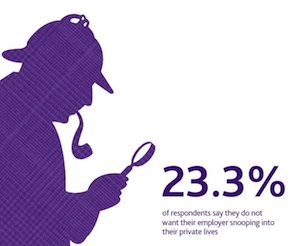What happens in Magaluf may not necessarily stay in Magaluf, especially when on social media
Social media, in all its various forms, has become an all-singing, all-dancing behemoth with no universally agreed purpose. People take photos of their frappucinos from Starbucks, share cat memes and use it as avenue to comment and vent frustrations. But in an age in which we are increasingly disconnected it gives us a voice and an opportunity to connect.
Andy Warhol may not necessarily have factored in social media when talking about 15 minutes of fame, but to be Twitter famous actually means something in the online lexicon. Social media posts can go round the world and back in mere seconds, but a word to the wise, there is fame and there is infamy.
Ideally, you would want a witty remark or intelligent observation to start trending rather than Tinder’s recent stream of defensive tweets to a Vanity Fair article or a comment about your work using the not so subtle hashtag #ihatemyboss (people do use it, along with many others). The point I am trying to make is that once online, the post is in the public domain and can spread like wildfire; it is out of your control and you never know who may see it.

Earlier this year we carried out research into employee attitudes to social media. 23.3% of respondents to the Capita Employee Insight Report indicated that they don’t want their employer snooping into their private lives and 30% wanted to keep their social and work life completely separate. However, there are a growing number of cases seeing employees dismissed for their behaviour on social media.
Eva Caneiro, Chelsea FC’s first team doctor, is the latest high profile individual to fall victim with her Facebook post allegedly incensing club manager Jose Mourinho seeing her fall down the professional pecking order at the club. A man in Florida was recently fired for joking about getting married to his dog Rocco in the wake of the legalisation of gay marriage in the States. In February, a girl was sacked before she had even started her new job after posting a rude tweet about her prospective employment. The list of clashes between work life and social media continues to grow.
It may be considered unfair for employees to be held culpable for their activity on personal social media accounts, but just because it is personal doesn’t necessarily mean it is private, in fact far from it. Without stringently checking privacy settings, most social media platforms will set you up with an open profile, meaning that any Tom, Dick, Harry or employer can stumble across what you’re chirping about. It could be considered intrusive to be poking through the Magaluf 05 album in which things got a little out of hand in the same way if your employer were to turn up at your house and peer through the window because they know where you live.
Ultimately, employers carry the weight of reputational risk when frustrations are publicised and immortalised online. An employee posting criticisms about their employer or acting in a contentious manner could damage a company’s professional reputation, so it is understandable for a company to take an interest in what its employees post, a modern form of PR given how online new sites continually pick up on stories of this ilk.
From an employee’s perspective, it is all too easy to forget about the possible repercussions of a social media post when typing away in a furied haze, especially when of the mentality that social media is hallowed grounds where employers shouldn’t tread. However, when your posts are in the public domain, there for others to see, it is important to be aware of network effects and how far and fast a post can travel.
Just be aware that we are all nodes in a giant, digital network and until an Orwellian contraption has been developed enabling employers to monitor their social media footprint more holistically, the most sensible thing for an employer to do is implement a social media policy highlighting the dos and don’ts and the consequences of not adhering to it. This will give both employers and employees clear expectations about social media and remove any subjective bias.
And remember, digital footprints are easy to track, especially if you know where to look. As social media is an opt in format, a conscious action that users have to make before publishing, maybe think twice about what you post and close the curtains with your privacy settings, as you never know who might be watching.
_______________________________________________
Twitter handle: Follow @hashtagrobin
This article was supplied by Robin Gray, engagement consultant, Capita.
Supplied by REBA Associate Member, Capita Employee Solutions
UK leader in technology-enabled business process management and outsourcing solutions.







